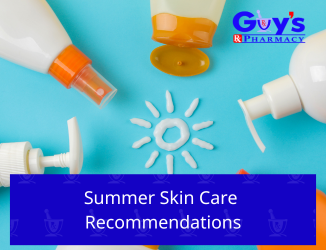Skin care during the summer months is important to minimizing the risk of skin damage from the sun. The sun’s UV rays are more intense during the warmer months, increasing the risk of sunburn and sun damage. Knowing how to protect your skin doesn’t have to be difficult, especially if you turn to a licensed pharmacist for guidance. Remember, you should protect your skin from damaging suns rays year-round, but it is particularly important during the summer.
Understanding Sunscreen & Skin Care
Sunscreen creates a barrier to protect your skin it from the intensity of UV light. It is important to help prevent sunburn, premature aging, and even skin cancer. There are two common forms available:
Physical (mineral) sunscreens
Mineral sunscreens contain ingredients such as zinc oxide and titanium dioxide in them. These minerals build a barrier on the surface of the skin that blocks and scatters the UV rays. These physical UV blockers add a film to your skin’s surface to block out the rays from penetrating. They are the best option for those with sensitive skin.
Chemical sunscreens
A chemical sunscreen has ingredients which absorb the UV rays, protecting your skin from them. They act as a sponge to absorb the damaging UV rates, and then convert them to non-damaging heat, these sunscreens are more versatile. Choose those best suited for your skin tone.
Choosing the Right SPF
The American Academy of Dermatology Association recommends a sunscreen product with an SPF of 30 or higher. This protects our skin from sunburn. SPF, or Sun Protection Factor, is a measurement of how well a product can protect your skin. Higher SPF means more protection from intense solar exposure, as noted by the US Food and Drug Administration.
A product labeled SPF 30 will allow about 3% of UVB rays to reach your skin, while a product labeled SPF 50 will allow about 2% of UV rays to strike the skin. Choose an SPF based on your skin tone. SPF 30 tends to be best for most people, but SPF 50 or higher is better if you burn easily.
Broad Spectrum Protection
Look for a product that states it is a “broad spectrum” product, which means it protects your skin from both UVA and UVB rays. UVA rays penetrate deeper into the skin, causing more damage, and a higher risk of cancer, aging, and inflammation. UVB rays are more associated with skin burns.
Proper Sunscreen Application
Most people need about 1 ounce of sunscreen on exposed skin to remain protected. That’s about the amount it takes to fill a shot glass. Apply it at least 15 minutes prior to going outside and then reapply every 2 hours. If you’re swimming or sweating, reapply more frequently.
Additional Skin Care Tips
Keep these tips in mind as you work to protect your skin:
- A good sunscreen is a must for daily use, not just when you’re planning to be outside.
- Put in place a comprehensive skin care protection plan to keep your skin’s inflammation levels low.
- Always seek out the shade.
- Don’t forget sunglasses to protect your eyes.
Treating Sunburn
If you suffer from sunburn, get out of the sun as a first step. You can use over-the-counter pain relievers to help with discomfort. Applying a cool, damp towel to the area for 10 minutes at a time can also provide relief. Aloe vera gel is well-known for its soothing and cooling properties, making it ideal for treating sunburn. It helps to reduce redness and inflammation while providing moisture to the skin. You’ll find a number of products at the pharmacy that can help to soothe pain and encourage healing. But it is more important to focus on prevention of sunburn. Visit any of our Guy’s Pharmacy locations for personalized advice and product recommendations. Sunburn isn’t fun, but these tips can help you to safeguard your skin.

